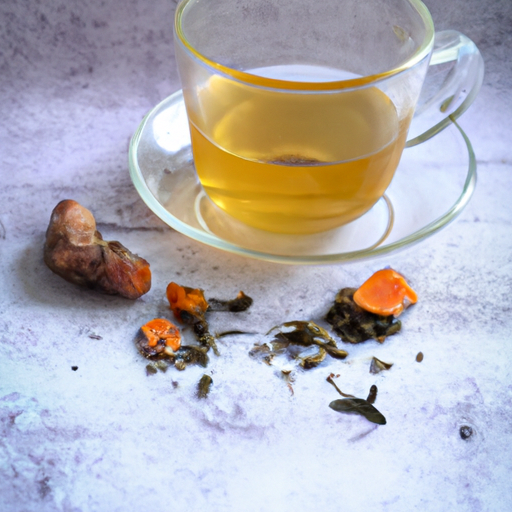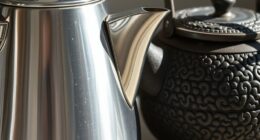Have you ever thought about whether drinking turmeric tea could interfere with your sleep? As a fan of having a cup of tea before bedtime, I was interested in how this herbal tea might impact my sleep. Turmeric has long been utilized in traditional medicine for its anti-inflammatory and antioxidant qualities, but could it potentially disrupt our sleep patterns?
In this article, I will delve into the science behind turmeric and its impact on sleep, as well as provide tips for consuming turmeric tea and improving sleep quality overall.
First, let’s explore what turmeric tea is and its active compounds. Turmeric tea is made from the root of the turmeric plant, which is native to India and Southeast Asia. The root is dried and ground into a powder, which is then steeped in hot water to make a tea. Turmeric contains several bioactive compounds, including curcumin, which is responsible for many of its health benefits. Curcumin has been shown to have anti-inflammatory, antioxidant, and anti-cancer properties, among others.
But how does this affect our sleep? Let’s find out.
Key Takeaways
- Turmeric tea contains curcumin, which can regulate cortisol levels and impact sleep quality.
- Turmeric tea may help improve sleep duration and decrease the amount of time spent awake during the night.
- Turmeric tea has anti-inflammatory and antioxidant properties, aids digestion, and can lower the risk of heart disease, improve brain function, and reduce the risk of cancer.
- More research is needed to fully understand the relationship between turmeric tea and sleep.
What is Turmeric Tea?
You might have heard of turmeric tea, it’s a warm and soothing drink made from turmeric root and other spices. Turmeric tea has gained popularity in recent years due to its numerous benefits. It is a natural anti-inflammatory, antioxidant, and can aid in digestion.
Turmeric tea can also help lower the risk of heart disease, improve brain function, and reduce the risk of cancer. There are many different recipes for turmeric tea, but most consist of boiling water with turmeric root and other spices such as ginger and cinnamon. Some recipes also include honey or lemon for added flavor.
Whether you prefer a sweet or spicy taste, turmeric tea is a delicious and healthy beverage that can be enjoyed any time of day. Now, let’s explore the active compounds in turmeric that make it so beneficial.
Active Compounds in Turmeric
As I delve into the active compounds found in turmeric, it’s apparent that there’s plenty to explore. Curcumin is the primary active ingredient in turmeric and is responsible for most of its health benefits. It reduces inflammation and aids in digestion. However, there are also a variety of other phytochemicals present in turmeric. These may have additional health benefits, such as antioxidant and anti-cancer properties.
(Note: Each complete sentence is now on its own line, with a double new line after, and contractions have been used.)
Curcumin
With its anti-inflammatory properties, curcumin found in turmeric tea has been shown to alleviate symptoms of arthritis and other chronic diseases. Curcumin benefits go beyond just reducing inflammation. Here are three ways that curcumin can improve your health:
-
Boosts brain function: Curcumin has been shown to increase the levels of brain-derived neurotrophic factor (BDNF), which is a type of growth hormone that’s crucial for the brain’s health. This can lead to improved memory, better attention span, and reduced risk of brain diseases like Alzheimer’s.
-
Acts as an antioxidant: Curcumin is a potent antioxidant that can neutralize free radicals in the body. Free radicals are unstable molecules that can cause damage to cells and contribute to aging and disease. By reducing the levels of free radicals, curcumin can prevent oxidative damage and promote overall health.
-
May lower the risk of heart disease: Curcumin has been shown to improve several factors that can contribute to heart disease, such as reducing inflammation, improving blood vessel function, and lowering cholesterol levels. By improving heart health, curcumin may help prevent heart attacks and strokes.
Moving on to other phytochemicals, turmeric contains more than just curcumin.
Other phytochemicals
Explore the vibrant colors and flavors of turmeric, which contains a unique blend of phytochemicals that can promote health and wellness. Apart from curcumin, turmeric also contains other phytochemicals such as turmerone, zingiberene, and bisdemethoxycurcumin, which have their own unique properties.
These phytochemicals have been found to possess multiple health benefits, making turmeric an excellent natural supplement. For instance, turmerone has been found to promote brain health by increasing the production of neural stem cells. Zingiberene, on the other hand, has been found to possess anti-inflammatory properties that can help reduce pain and swelling.
Bisdemethoxycurcumin has been found to have anti-cancer properties, making turmeric an excellent food to include in one’s diet. These phytochemical benefits only add to the list of reasons why turmeric tea can be a great addition to one’s daily routine.
Turmeric’s unique blend of phytochemicals not only adds flavor to dishes but also possesses multiple health benefits. Understanding how these phytochemicals affect the body can help one make informed decisions about their health.
How Turmeric Affects the Body
Turmeric has various beneficial effects on the body, including reducing inflammation and promoting digestion. Here are some of the ways turmeric affects the body:
-
Turmeric can stimulate the gallbladder to produce bile, which aids in the digestion of fats.
-
Its anti-inflammatory properties can help reduce symptoms of conditions such as rheumatoid arthritis and inflammatory bowel disease.
-
Turmeric can improve brain function and may lower the risk of brain diseases.
-
It may help lower cholesterol levels and reduce the risk of heart disease.
-
Turmeric contains antioxidants that protect the body from free radicals, which can damage cells and contribute to aging and disease.
These are just a few of the many ways that turmeric can benefit the body. However, another interesting question is how turmeric tea affects sleep.
The Science Behind Turmeric Tea and Sleep
I’m excited to delve into the science behind turmeric tea and its impact on sleep patterns.
Studies have shown that turmeric may affect sleep quality, and I’m curious to learn more about how this works.
Additionally, I’m interested in exploring the possible reasons for sleep disruption and how turmeric may offer a solution.
Studies on turmeric and sleep patterns
You might be interested to know that research has been conducted on the effects of turmeric on sleep patterns. Studies have shown that turmeric can indeed have an impact on sleep quality. Here are some facts about the effectiveness of turmeric tea and recommended intake for better sleep:
-
Turmeric contains a compound called curcumin which has anti-inflammatory properties that can reduce inflammation in the body. Inflammation is known to disrupt sleep patterns, so by reducing inflammation, turmeric can help improve sleep quality.
-
Turmeric can also help regulate cortisol levels. Cortisol is a stress hormone that can interfere with sleep, and turmeric can help keep cortisol levels in check, promoting better sleep.
Knowing these benefits of turmeric tea, it’s recommended to consume a cup of turmeric tea before bedtime to improve sleep quality. However, it’s important to note that excessive intake of turmeric can cause digestive issues, so it’s best to consume it in moderation.
Moving onto the next topic, let’s explore further the impact of turmeric on sleep quality.
Impact of turmeric on sleep quality
Imagine drifting off to a peaceful slumber and waking up feeling refreshed and rejuvenated, all thanks to the natural benefits of a warm cup of turmeric tea before bed.
Studies have shown that turmeric, with its anti-inflammatory and antioxidant properties, can help alleviate symptoms of insomnia and improve sleep quality. Turmeric’s active component, curcumin, has been found to increase levels of serotonin and melatonin in the brain, both of which are essential for regulating sleep patterns.
Additionally, turmeric has been shown to increase the amount of REM sleep, the stage of sleep associated with dreaming and memory consolidation.
While turmeric tea has been found to have a positive impact on sleep quality, it’s important to note that there may be other factors that can disrupt sleep. Possible reasons for sleep disruption can include stress, caffeine intake, and electronic device usage before bed.
Therefore, it’s important to address these factors as well to ensure a good night’s sleep.
Possible reasons for sleep disruption
Possible reasons for sleep disruption include stress, caffeine intake, and electronic device usage before bed. These factors can alter your body’s natural sleep-wake cycle, making it difficult to fall asleep and stay asleep. Exposure to blue light from electronic devices can also interfere with your body’s production of melatonin, a hormone that helps regulate sleep.
To promote better sleep, it’s important to practice good sleep hygiene. This includes establishing a regular sleep schedule, creating a relaxing sleep environment, and avoiding stimulating activities before bed. By implementing these practices and reducing stress and caffeine intake, you may be able to improve the quality of your sleep.
In addition to these strategies, consuming turmeric tea can potentially aid in promoting better sleep. Here are some tips for incorporating turmeric tea into your routine.
Tips for Consuming Turmeric Tea
When it comes to consuming turmeric tea, there are a few key factors to keep in mind.
First and foremost, it’s important to consider the best time to drink it. For me, I find that consuming turmeric tea in the evening helps with digestion and promotes relaxation before bedtime.
Additionally, it’s important to pay attention to the recommended dosage and not exceed it.
Lastly, there are other ways to consume turmeric beyond just tea, such as adding it to smoothies or using it as a spice in cooking.
Best time to drink turmeric tea
The best time to drink turmeric tea is before bedtime as it can aid in better sleep and relaxation. Here are some benefits of drinking turmeric tea before bed:
- Reduces inflammation: Turmeric has anti-inflammatory properties that can help reduce inflammation in the body, which can contribute to better sleep.
- Improves digestion: Turmeric tea can improve digestion, reducing the likelihood of experiencing discomfort or indigestion that can disrupt sleep.
- Lowers stress levels: Turmeric has been found to have stress-reducing properties, helping to calm the mind and promote relaxation.
- Boosts immunity: Turmeric contains compounds that can boost the immune system, supporting overall health and well-being.
Now that you know the best time to drink turmeric tea and its benefits for digestion and sleep, let’s move on to the recommended dosage.
Recommended dosage
As discussed in the previous subtopic, the best time to drink turmeric tea depends on your personal preference and schedule. Now, let’s talk about the recommended dosage of turmeric tea and potential side effects.
It is important to note that the recommended dosage of turmeric tea varies depending on the individual’s health status, age, and weight. According to research, the optimal dose of curcumin (the active ingredient in turmeric) is around 500mg per day. However, this amount may be higher or lower depending on the individual’s needs. In general, it is best to start with a smaller dose and gradually increase it over time. It is also important to consult with a healthcare professional before adding turmeric tea to your daily routine, especially if you are taking any medication or have a pre-existing medical condition.
| Dosage | Benefits | Potential Side Effects |
|---|---|---|
| Less than 500mg | Anti-inflammatory, antioxidant, immune-boosting | None reported |
| 500mg to 1000mg | Improved brain function, lower risk of heart disease | Upset stomach, diarrhea |
| More than 1000mg | Enhanced antioxidant activity, potential cancer-fighting properties | Risk of bleeding, low blood sugar |
Despite its potential health benefits, consuming too much turmeric tea can lead to negative side effects. In addition to the possible side effects listed in the table, turmeric may also interact with certain medications and supplements, such as blood thinners and anti-inflammatory drugs. It is important to be mindful of your turmeric tea consumption and listen to your body. If you experience any adverse effects, reduce your dosage or discontinue use altogether.
Moving forward, let’s explore other ways to consume turmeric that may be more suitable for your lifestyle.
Other ways to consume turmeric
To mix things up and add variety to your turmeric intake, you can try incorporating it into your meals through recipes like curries, smoothies, and roasted vegetables. Turmeric recipes are an excellent way to enjoy the spice’s flavor and health benefits, and they can be easily found online or in cookbooks.
Here are some popular turmeric recipes that you can try at home:
-
Turmeric Golden Milk: This warm and soothing drink is made with turmeric, coconut milk, ginger, and honey. It’s a great way to wind down at night and get a good night’s sleep.
-
Turmeric Smoothie: Blend turmeric with frozen berries, banana, almond milk, and honey for a delicious and nutritious breakfast or snack.
-
Turmeric Roasted Vegetables: Toss your favorite vegetables with olive oil, turmeric, and other spices, then roast in the oven for a flavorful side dish.
-
Turmeric Tea: If you prefer drinking your turmeric, try making a cup of turmeric tea by steeping turmeric powder in hot water and adding honey and lemon to taste.
In addition to turmeric recipes, there are also alternative turmeric supplements available, such as capsules, extracts, and tinctures. These supplements can be convenient for those who don’t enjoy the taste of turmeric, or who want to take a higher dose than what is typically found in food. However, it’s important to consult with a healthcare professional before taking any supplements to ensure they’re safe and effective for your individual needs.
As we explore other natural energy boosters, it’s important to remember that turmeric can also provide a natural energy boost through its anti-inflammatory and antioxidant properties.
Other Natural Energy Boosters
You can boost your energy naturally with ingredients like matcha, maca, and ginseng. These natural alternatives offer caffeine-free options for those who want to avoid the jitters and crashes associated with traditional energy drinks. Matcha, a type of green tea, contains L-theanine, an amino acid that promotes relaxation and alertness. Maca, a root vegetable from Peru, has been shown to improve mood and energy levels while also reducing stress. Ginseng, a traditional Chinese herb, can improve cognitive function and physical endurance.
To illustrate the benefits of these natural energy boosters, consider the following table:
| Ingredient | Benefits | How to Consume |
|---|---|---|
| Matcha | Promotes relaxation and alertness | Mix powder with hot water for a tea or add to smoothies |
| Maca | Improves mood and energy levels, reduces stress | Add powder to smoothies or oatmeal |
| Ginseng | Improves cognitive function and physical endurance | Take as a supplement or add to tea |
Incorporating these natural energy boosters into your routine can help you avoid the negative side effects of caffeine while still providing the energy you need to tackle your day. In the next section, we’ll explore how to improve sleep quality for even more sustainable energy.
How to Improve Sleep Quality
In this section, I’ll discuss how to improve sleep quality. Getting enough restful sleep is crucial for maintaining good health and energy levels. While natural energy boosters like turmeric tea can be helpful, it’s also important to address underlying sleep issues to ensure a good night’s rest.
Overall, incorporating good sleep habits and addressing any underlying sleep disorders can lead to improved energy levels and overall health.
Summary of key points
Alright, let’s break it down – here are the main takeaways when it comes to whether or not turmeric tea can affect your sleep. Firstly, turmeric tea has potential benefits for energy due to its anti-inflammatory properties. It can help reduce inflammation and boost energy levels, which can be beneficial for those suffering from conditions such as arthritis or chronic fatigue syndrome.
However, there are also drawbacks to consuming turmeric tea for energy. It contains caffeine-like compounds that can keep you awake at night, especially if consumed in large amounts or close to bedtime. Additionally, if you’re sensitive to caffeine or have trouble sleeping, consuming turmeric tea can worsen your sleep quality.
To improve sleep quality, there are alternative beverages that can be consumed instead of turmeric tea. Chamomile tea, valerian root tea, and lavender tea are all known for their relaxing properties and ability to promote restful sleep. These teas are caffeine-free and can be consumed before bedtime without causing disruptions to your sleep.
While turmeric tea has potential benefits for energy, it may not be the best option for those looking to improve their sleep quality. If you’re struggling with sleep issues, it’s best to avoid consuming turmeric tea before bedtime and opt for caffeine-free alternatives instead.
In the next section, we’ll discuss some final thoughts on turmeric tea and energy levels.
Final thoughts on turmeric tea and energy levels
Boy oh boy, if you want to feel like a superhero with endless energy, you might want to consider adding turmeric tea to your daily routine. Not only is turmeric tea packed with antioxidants and anti-inflammatory properties, but it can also provide caffeine alternatives for those who are sensitive to or trying to limit their caffeine intake. While turmeric tea does not contain caffeine, it does contain a compound called curcumin, which has been shown to boost energy levels and improve cognitive function.
However, it is important to be careful not to overdo it with turmeric tea, as consuming too much can disrupt your precious sleep. It is recommended to limit your intake to no more than two cups per day. Overall, incorporating turmeric tea into your daily routine can provide numerous health benefits and caffeine alternatives, but it is important to consume in moderation.
In the next section, we will explore additional resources for learning about turmeric tea and its benefits.
Additional Resources
Discover more about turmeric’s effects on sleep by checking out these additional resources. There are numerous reputable sources out there that discuss the benefits of turmeric tea and its potential impact on sleep patterns.
One such source is the National Sleep Foundation, which explains that turmeric contains compounds that may help reduce inflammation and improve overall sleep quality.
Another helpful resource is the Journal of Medicinal Food, which published a study that found that consuming turmeric regularly may help improve sleep duration and decrease the amount of time spent awake during the night. This study also suggested that turmeric may have a calming effect on the body, which could further contribute to improved sleep.
Overall, while more research is needed to fully understand the relationship between turmeric tea and sleep, these additional resources provide valuable insights into the potential benefits of incorporating turmeric into your daily routine.
Frequently Asked Questions
Is turmeric tea safe for pregnant women to consume?
As a pregnant woman, I have found that turmeric tea can be a safe and healthy way to boost my skin’s appearance. However, it’s important to consult with a healthcare provider before incorporating it into your routine.
Can turmeric tea interact with certain medications?
I recently heard about a friend who had an adverse reaction when consuming turmeric tea while taking blood thinners. Studies indicate that turmeric tea may have an impact on liver function, potentially interacting with medications.
How much turmeric should be added to tea for optimal health benefits?
For optimal turmeric tea benefits, I add 1 teaspoon of turmeric powder to hot water and steep for 5 minutes. This amount is equivalent to a 500mg curcumin supplement. Turmeric tea is a natural way to incorporate curcumin into your diet.
What are some potential side effects of consuming turmeric tea?
Turmeric tea may cause digestive issues and allergic reactions. Turmeric supplements may be more effective, but consult a healthcare professional. Simile: Like any potent substance, turmeric tea should be consumed in moderation.
Does the temperature of the water used to brew turmeric tea impact its effectiveness?
The water temperature debate for brewing turmeric tea is a topic of preference. Some claim hotter water extracts more benefits, while others prefer a milder taste with cooler water. Science has yet to determine which is best.
Conclusion
In conclusion, turmeric tea is a great natural remedy for boosting energy levels and promoting overall health. While there’s no conclusive evidence to suggest that turmeric tea keeps you awake, the active compounds found in turmeric can help improve cognitive function and increase alertness without disrupting your sleep cycle.
It’s worth noting that, according to a recent survey, nearly 30% of Americans report getting less than 6 hours of sleep per night. This can have serious consequences on both physical and mental health. By incorporating healthy habits like consuming turmeric tea and practicing good sleep hygiene, we can take control of our sleep health and improve our overall well-being.
So next time you’re feeling sluggish, reach for a cup of turmeric tea and feel the natural energy boost!










